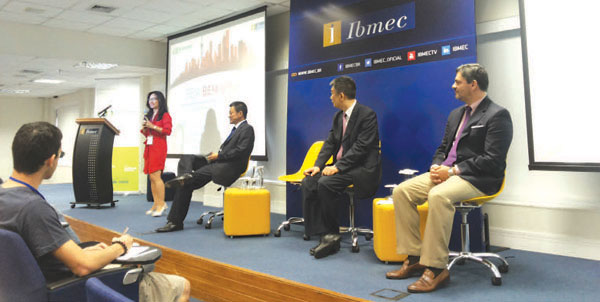Can China-Brazil trade keep up its promising momentum
Updated: 2014-08-25 06:57
By Zhang Fan(China Daily Latin America)
|
|||||||||
 |
|
Ann Lee (standing left), adjunct professor of economics and finance at New York University, said at a conference held by Brazilian law firm Demarest in Sao Paulo on Aug 19 that China’s economy can still maintain rapid growth in the next 20 years. [CHEN WEIHUA / XINHUA] |
The world is facing overwhelming change and the rise of China is among the key factors, said Marcos Troyjo, a Brazilian economist and co-director of the BRICLab at Columbia University, at a conference hosted by Brazilian law firm Demarest in Sao Paulo on Aug 19.
Troyjo said China has entered a new stage, what he calls "China 2.0". Compared with the 30 years following the county's Reform and Opening-up policies of 1978, China can now no longer rely on governmental investment and foreign trade to simulate its economic development.

China 2.0 needs to alter its economic development, reduce overproduction and enlarge its importation, said Troyjo, which could mean great opportunities for Brazilian industries.
China is now Brazil's largest trade partner in the world and also its largest exporting and importing markets. Trade volume between the two countries surpassed $90 billion last year and the figure is expected to increase this year.
Such development is to some extend largely driven by the rapid development of China's economy. The world's second largest economy requires large amounts of natural resources and agricultural products to meet the needs of its industries and people.
According to the World Steel Association, the global steel consumption from 2001 to 2012 increased by 88 percent and China's steel consumption increased by 4.2 times, with an annual increase rate of 13.8 percent.
Data from 2012 show that about 62.7 percent of China's total steel consumption comes from other countries, with 47.2 percent from Australia and 22.1 percent from Brazil.
While China is becoming a more important trade partner with Brazil, some are starting to worry if such economic momentum can be sustained, since China's annual GDP growth rate has been less than 8 percent since 2011 and the newest figure is 7.67 percent, according to China's National Bureau of Statistics.
"China's economy can still maintain a rapid growth in the next 20 years," said Ann Lee, adjunct professor of economics and finance at New York University, "though the rate is lower compared with the past, which used to be more than 9 percent in 2011, it is still higher than other countries."
However, the significant trade volume between China and Brazil does not mean there are no problems in such a relationship.
Chinese exporting companies are facing increasing anti-dumping investigations from Brazil. In June, for example, the Brazilian government initiated seven anti-dumping investigations into Chinese products.
While Chinese companies find it's getting harder to export to Brazil, some Brazilian companies are complaining about the challenges they face from Chinese products.
"Some of our clients do not want Chinese products because they are worried about the 'invasion' of Chinese companies," said Christian Dihlmann, president of the Brazilian Association of Tooling Industry.
Dihlmann said because of the Brazilian tax policy and high labor cost, Brazilian products are more expensive than their Chinese counterparts, which limits their competitiveness on global markets. "China must show it also wants to buy some products from Brazil," he added.
Actually, though Brazil was only China's ninth largest trade partner in 2013, Brazil enjoyed a trade surplus of $8.7 billion last year. The World Trade Organization shows that in 2013, Brazil initiated 39 lawsuits, the highest number among all member countries.
"The main reason for Brazil's large amount of trade lawsuit towards other countries is because of its own economic development problems," said Qiu Yunxia, a researcher from the Institute of Latin American Studies of the Chinese Academy of Social Sciences.
Qiu told International Business Daily that Brazil's import substitution trade policies played a role in fuelling its protectionist trade policies. Emerging markets like Brazil and Argentina tend to strengthen their protection of domestic industries, especially in the manufacturing sector.
"In such circumstances, Chinese companies need to focus more on upgrading products and avoiding trade conflicts by establishing local factories and realizing product diversification," she said.
Contact the writer at fanzhang@chinadailyusa.com

 Music at her fingers
Music at her fingers
 Across America Over the Week (Jan 16 - Jan 22)
Across America Over the Week (Jan 16 - Jan 22)
 Spend Chinese New Year in style
Spend Chinese New Year in style
 Ili river valley becomes a popular destination for swans
Ili river valley becomes a popular destination for swans
 Philip Ma: from scientist to businessman
Philip Ma: from scientist to businessman
 Birmingham's Spotlight on China dinner
Birmingham's Spotlight on China dinner
 How to distinguish doucai, wucai, Famille-rose and enamel porcelain
How to distinguish doucai, wucai, Famille-rose and enamel porcelain
 Xinjiang lake in bumper fishing season
Xinjiang lake in bumper fishing season
Most Viewed
Editor's Picks

|

|

|

|

|

|
Today's Top News
Houston's SW Chinatown
China to focus on reforms, opening of capital market
Slowdown brings new risks to banks
Trade group calls for BIT
Market status for China is 'political' issue
Birmingham's Spotlight on China dinner
Bank takes renminbi-clearing seriously
Traditional Garb
US Weekly

|

|








